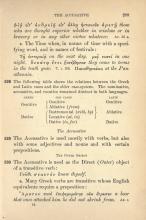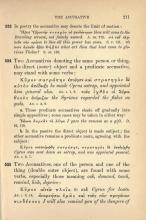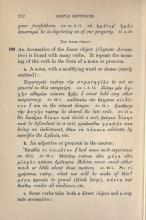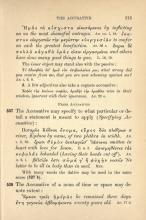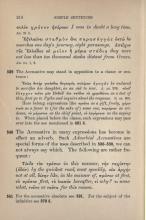529.The Accusative is used mostly with verbs, but also with some adjectives and nouns and with certain prepositions.
Accusative as Direct Object
530. The Accusative is used as the Direct (Outer) object of a transitive verb:
Γνῶθι σεαυτόν.
Know thyself.
a. Many Greek verbs are transitive, requiring a preposition in the English translation.
Ἄρκτον ποτὲ ἐπιφερομένην οὐκ ἔτρεσεν.
A bear that once attacked him he did not shrink from.
Xen. Anabasis 1.9.6
οὐδὲ Δία ξένιον ᾐδέσθη.
He felt no shame even before Zeus, protector of the stranger.
Xen. Anabasis 3.2.4
σῑγᾶν τύχᾱς
to keep silent about my fortune
Aesch. Prometheus Bound 106
So, among many others, αἰσχῡ́νομαι (feel shame before) ὄμνῡμι (swear by), λανθάνω (escape the notice of; Latin lateo), εὖ or κακῶς ποιῶ (do good or harm to), φυλάττομαι (guard against), ἀμῡ́νομαι (defend myself against), πλέω τὴν θάλατταν (sail over the sea), φθάνω (get the start of).
b. Some intransitive verbs become transitive when compounded with certain prepositions, as διαβαίνω (cross) ἀποδιδρᾱ́σκω (run away from).
c. Many verbs vary, and are used now as transitive, now as intransitive. Thus ἀκούω (hear) and αἰσθάνομαι (perceive) take the accusative and genitive; μέμφομαι (blame) takes the accusative or the dative. Especially in poetry some verbs take the accusative that do not in prose.
531. A few verbal adjectives and nouns admit a direct object (as participles and infinitives of transitive verbs do regularly).
Ἐπιστήμονες τὰ προσήκοντα
knowing their duty
Xen. Cyropaedia. 3.3.9
σὲ φύξιμος
able to escape thee
Soph. Antigone. 787
τὰ μετέωρα φροντιστής
one who studies things on high
Plato Apology 18b
a. A phrase may be equivalent to a transitive verb, and so take an accusative.
Tεθνᾶσι τῷ δέει τοὺς τοιούτους ἀποστόλους.
They die of fear of (are frightened to death at) such expeditions.
Demosthenes 4.45
532. The Accusative is used after the particles of swearing, νή and μά, as with ὄμνῡμι (§ 530.a, above). νή affirms; μά denies, unless ναί (yes) precedes.
Nὴ Δία or ναὶ μὰ Δία
Yes, by Zeus.
μὰ Δία or οὐ μὰ Δία
No, by Zeus.
533. In poetry the accusative may denote the limit of motion.
Ἥξεις Ὑβριστὴν ποταμὸν οὐ ψευδώνυμον.
Thou wilt come to the brawling stream, not falsely named.
Aesch. Prometheus Bound 717
σὲ τόδʼ ἐλήλυθε πᾶν κράτος.
To thee all this power has come.
Soph. Philoctetes 141–142
τίς ποτε ἀγλαᾱ̀ς ἔβᾱς Θήβᾱς;
What art thou that hast come to glorious Thebes?
Soph. Oedipus the King 151–153
534. Two Accusatives denoting the same person or thing, the direct (outer) object and a predicate accusative, may stand with some verbs.
Κῦρον σατράπην ἐποίησε καὶ στρατηγὸν δὲ αὐτὸν ἀπέδειξε.
He made Cyrus satrap, and appoited him general also.
Xen. Anabasis 1.1.2
τοὺς ἰχθῦς οἱ Σύροι θεοὺς ἐνόμιζον.
The Syrians regarded the fishes as gods.
Xen. Anabasis 1.4.9
a. These predicate accusatives shade off gradually into simple appositives; some cases may be taken in either way.
Ἔδωκα δωρειᾱ̀ν τὰ λύτρα.
I gave the ransom as a gift.
Demosthenes 19.170
b. In the passive the direct object is made subject; the other accusative remains a predicate noun, agreeing with the subject.
Κῦρος κατεπέμφθη σατράπης, στρατηγὸς δὲ ἀπεδείχθη.
Cyrus was sent down as satrap, and was appointed general.
Xen. Anabasis 1.9.7
535. Two Accusatives, one of the person and one of the thing (double outer object), are found with some verbs, especially those meaning ask, demand, teach, remind, hide, deprive.
Κῦρον αἰτεῖν πλοῖα
to ask Cyrus for boats
Xen. Anabasis 1.3.14
ἀναμνήσω ῡ̔μᾶς καὶ τοὺς τῶν προγόνων κινδῡ́νους.
I will also remind you of the dangers of your forefathers.
Xen. Anabasis 3.2.11
τὰ ἡμέτερʼ ἡμᾶς ἀποστερεῖ.
He is depriving us of our property.
Demosthenes 4.50
Inner (Cognate) Accusative
536. An Accusative of the Inner object (Cognate Accusative) is found with many verbs. It repeats the meaning of the verb in the form of a noun or pronoun.
a. A noun, with a modifying word or clause (rarely omitted).
Στρατηγεῖν ταύτην τὴν στρατηγίᾱν
to act as general in this campaign
Xen. Anabasis 1.3.15
ἄλλην μὲν ἀρχὴν οὐδεμίαν πώποτε ἦρξα.
I never held any other magistracy.
Plato Apology 32a–b
κινδῡνεύω τὸν ἔσχατον κίνδῦνον.
I am in the utmost danger.
Plato Apology 34c
συνέφυγε τὴν φυγὴν ταύτην.
He shared the late exile.
Plato Apology 21a
So δικάζειν δίκην τινά (decide a suit), φεύγειν δίκην τινά (be defendant in a suit), γράφεσθαι γραφήν τινα (bring an indictment), θῡ́ειν τὰ Λύκαια (celebrate by sacrifice the Lykaia), etc.
b. An adjective or pronoun in the neuter.
Ἔπαθόν τι τοιοῦτον.
I had some such experience as this.
Plato Apology 22a
Μελήτῳ τούτων οὔτε μέγα οὔτε μῑκρὸν πώποτε ἐμέλησεν.
Miletos never cared either much or little about these matters.
Plato Apology 26b
So τί χρήσεται τούτῳ; (what use will he make of this?), μέγα φρονεῖν (be proud, literally think large), πάντα πείθεσθαι (render all obedience), etc.
c. Some verbs take both a direct object and a cognate accusative.
Ἡμᾶς τὰ αἴσχιστα αἰκισάμενος
by inflicting on us the most shameful outrages
Xen. Anabasis 3.1.18
ἕκαστον εὐεργετεῖν τὴν μεγίστην εὐεργεσίᾱν
to confer on each the greatest benefaction
Plato Apology 36c
ἕτεροι δὲ πολλὰ κᾱ̓γαθὰ ῡ̔μᾶς εἰσιν εἰργασμένοι.
And others have done many good things to you.
Lysias 16.19
The inner object may stand also with the passive.
Tί ἀδικηθεὶς ὑπʼ ἐμοῦ νῦν ἐπιβουλεύεις μοι;
What wrong did you receive from me, that you are now scheming against me?
Xen. Anabasis 1.6.8
d. A few adjectives also take a cognate accusative.
Σοφὸς τὴν ἐκείνων σοφίᾱν, ἀμαθὴς τὴν ἀμαθίᾱν
wise in their wisdom, ignorant with their ignorance
Plato Apology 22e
Freer Accusatives
537. The Accusative may specify to what particular or detail a statement is meant to apply (Specifying Accusative).
Ποταμὸς Κύδνος ὄνομα, εὖρος δύο πλέθρων
a river, Kydnos by name, of two plethra in width
Xen. Anabasis 1.2.23
ἔρωτι θῡμὸν ἐκπλαγεῖσʼ Ἰᾱ́σονος
smitten in heart with love for Iason
Eur. Medea 8
ἀποτμηθέντες τᾱ̀ς κεφαλᾱ́ς
beheaded (having their heads cut off)
Xen. Anabasis 2.6.1
βέλτῑόν ἐστι σῶμά γʼ ἢ ψῡχὴν νοσεῖν.
'Tis better to be ill in body than in soul.
Menander FCG 75
With many words the dative my be used in the same sense (§ 527.b)
538. The Accusative of a noun of time or space may denote extent.
Ἔμεινε τρεῖς ἡμέρᾱς.
He remained three days.
ἔτη γεγονὼς ἑβδομήκοντα
seventy years old
Plato Apology 17d
πολὺν χρόνον ἠπόρουν.
I was in doubt a long time.
Plato Apology 21b
Ἐξελαύνει σταθμὸν ἕνα παρασάγγᾱς ὀκτώ.
He marches one dayʼs journey, eight parasangs.
ἀπεῖχον τῆς Ἑλλάδος οὐ μεῖον ἢ μῡ́ρια στάδια.
They were not less than ten thousand stades distant from Greece.
Xen. Anabasis 3.1.2
539. The Accusative may stand in apposition to a clause or sentence.
Ἔτλη θυτὴρ γενέσθαι θυγατρός, πολέμων ἀρωγᾱ́ν.
He endured to sacrifce his daughter, as an aid to war.
Aesch. Agamemnon 224–226
τῶνδʼ ἔλεγχον τοῦτο μὲν Πῡθώδʼ ἰών πεύθου τὰ χρησθέντα.
As a test of this, first go to Pytho and inquire about the response.
Soph. Oedipus the King 603
Here belong expressions like προῖκα (as a gift, freely), χάριν τινός (as a favor to [for the sake of] some one), τεκμήριον (as evidence), τὸ μέγιστον (as the chief point), τὸ λεγόμενον (as the saying is). When placed before the clause, such expressions may pass over into the use mentioned in § 491.d.
540.The Accusative in many expressions has become in effect an adverb. Such Adverbial Accusatives are special forms of the uses described in §§ 536 – 539 (above), we can not always say which. The following are rather frequent.
Tόνδε τὸν τρόπον
in this manner
τὴν ταχίστην (ὁδόν)
by the quickest road, most speedily
οὐκ ἀρχήν
not at all
δίκην
like, in the manner of
πρῶτον
at first
τὸ πρῶτον
first
τὸ λοιπόν
hereafter
τί
why?
τι
somewhat
τοῦτο or ταῦτα
for this reason
541. For the accusative absolute see § 591. For the subject of the infinitive see § 570.d.

